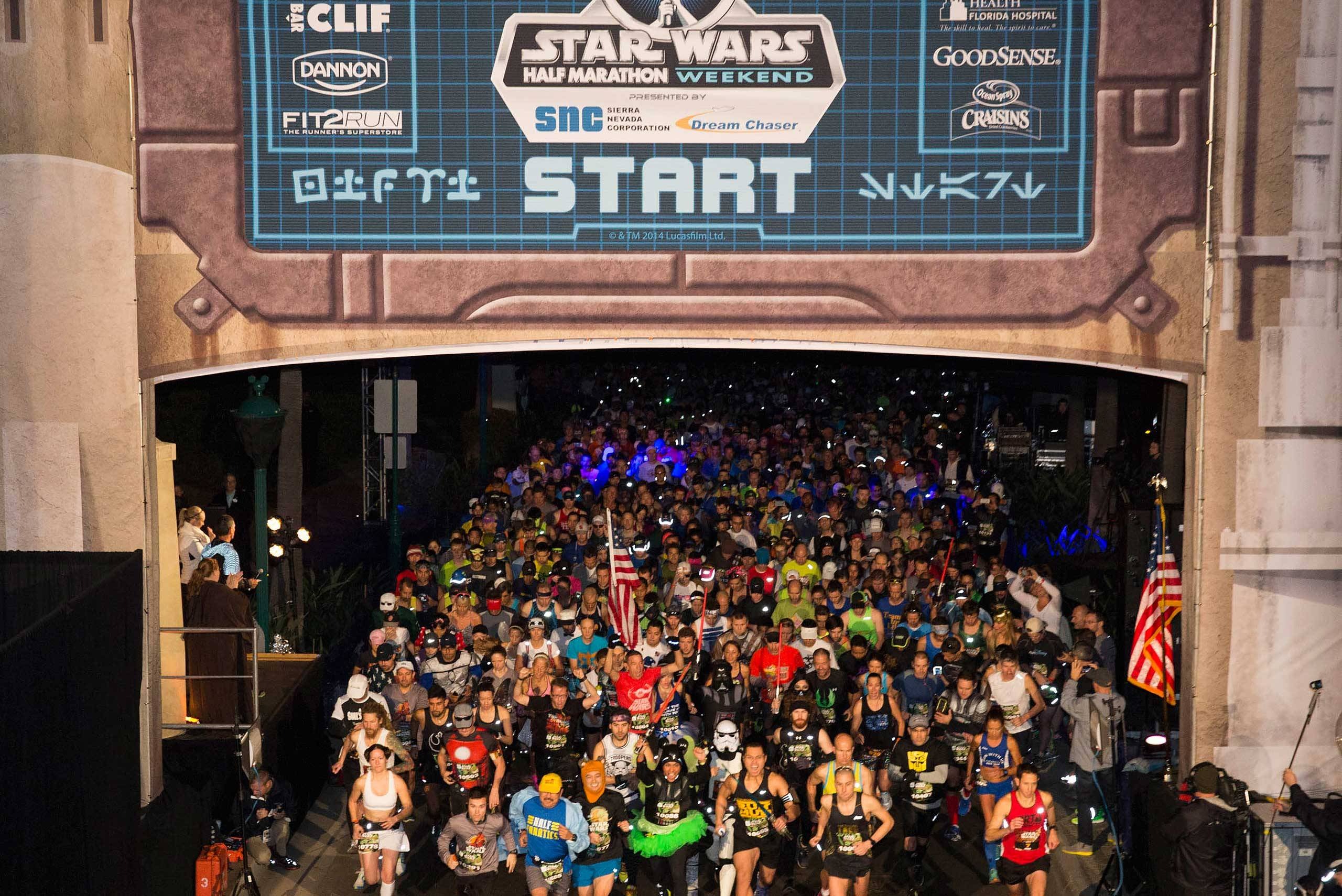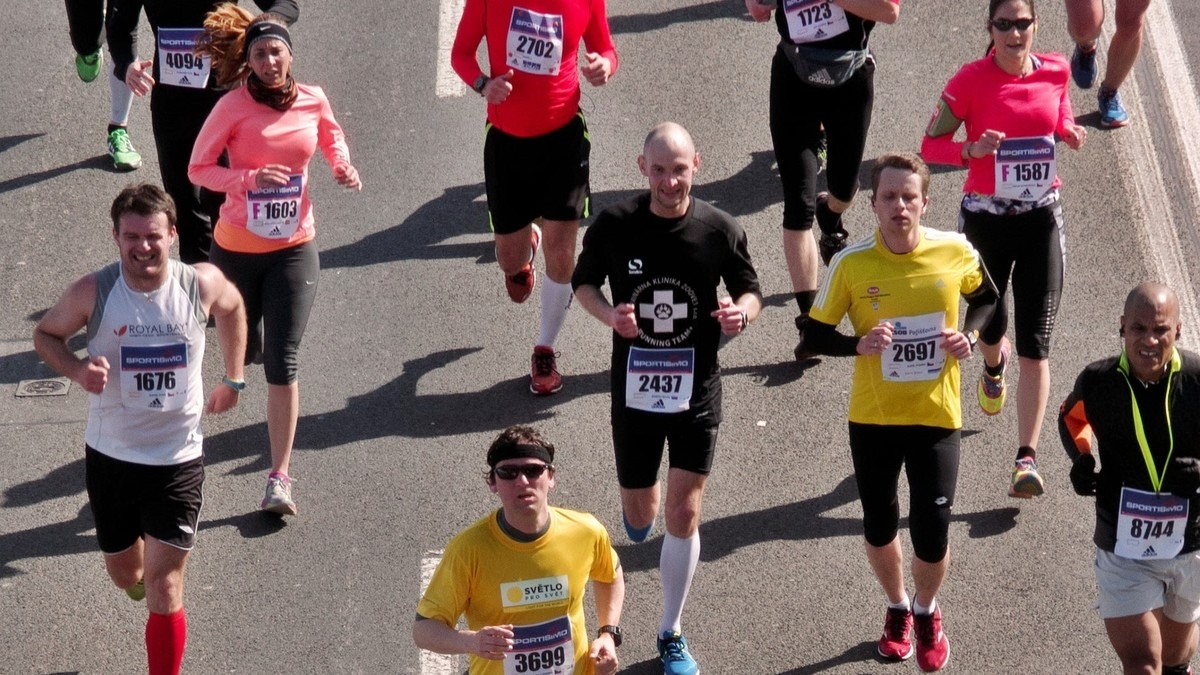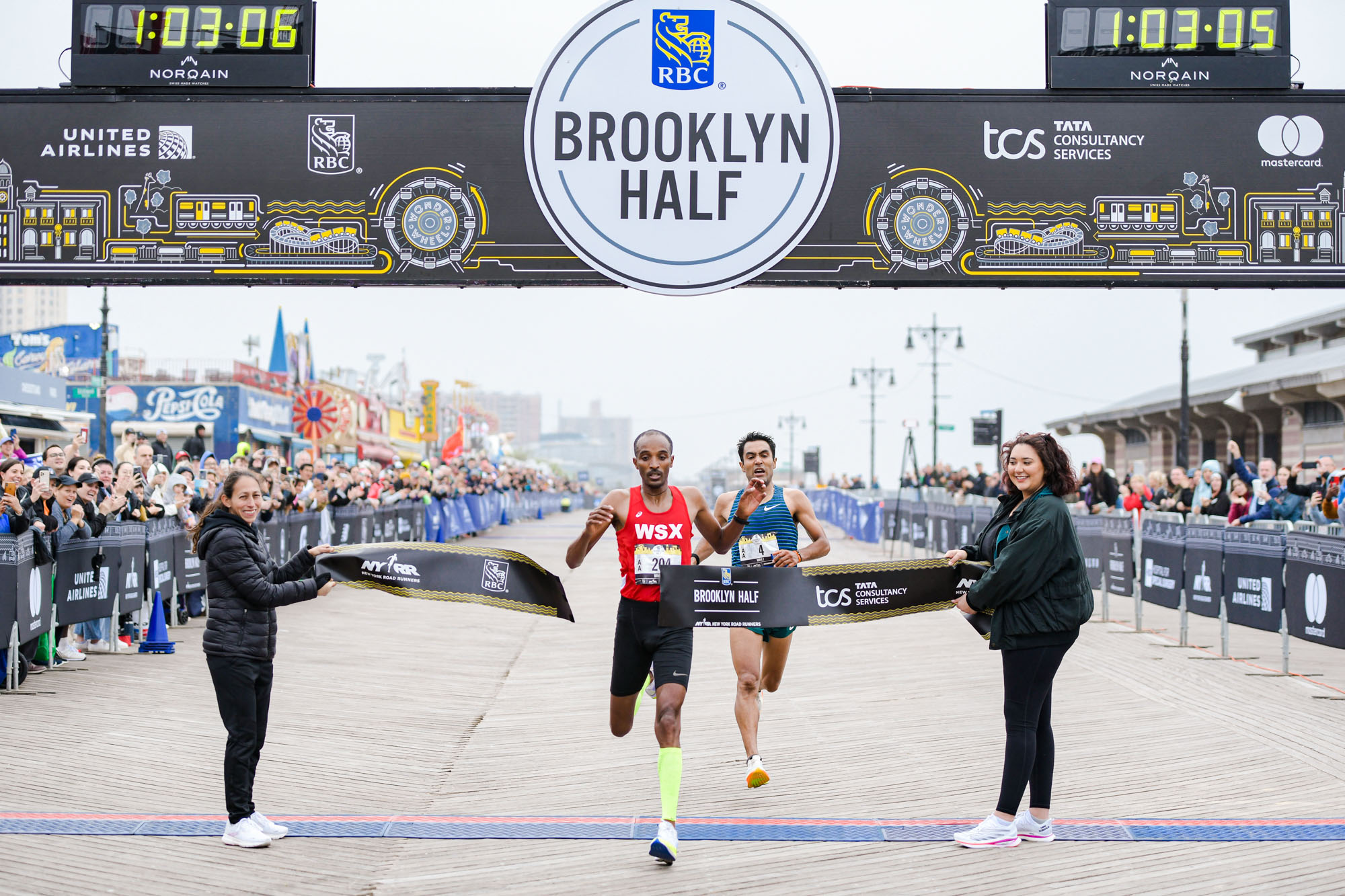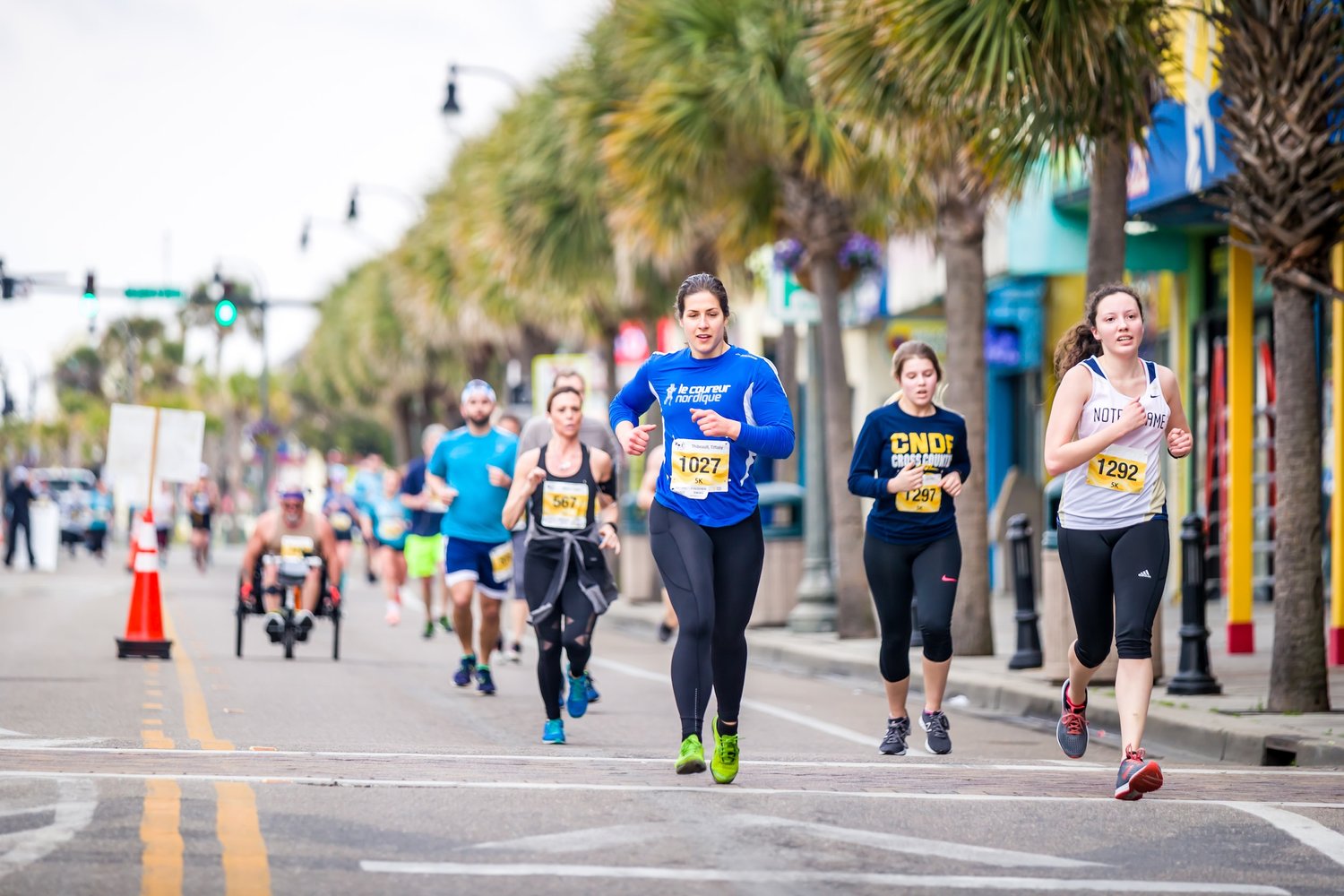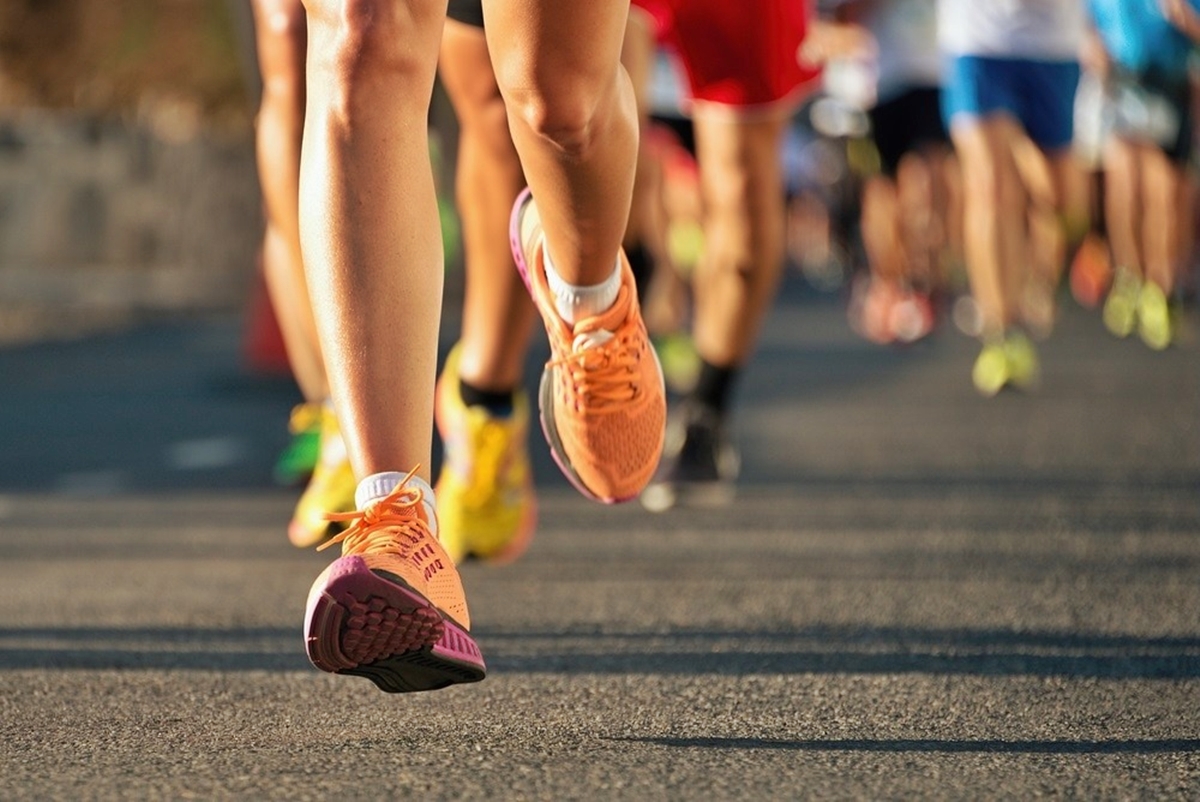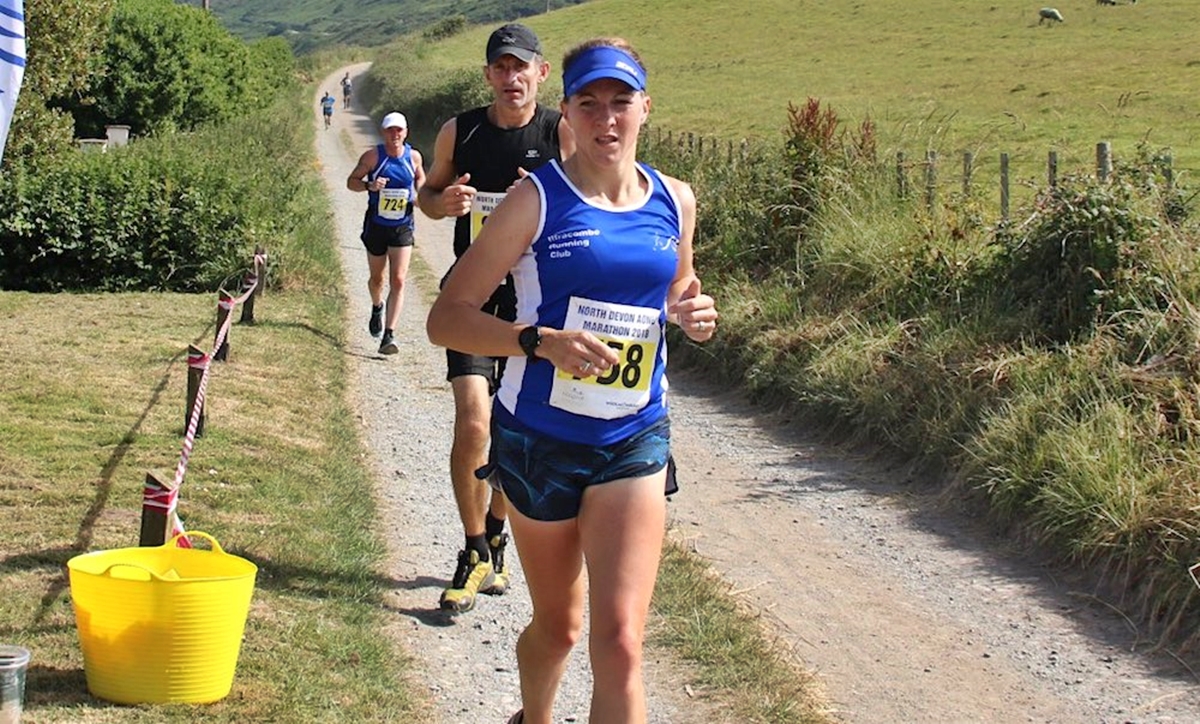

Featured
What To Eat After A Half Marathon
Modified: January 2, 2024
Discover the perfect post-race recovery meal ideas featured for half marathon runners. Replenish and refuel your body with nutritious foods to optimize your performance and aid in muscle recovery.
Introduction
Completing a half marathon is a significant achievement, requiring months of training and dedication. While crossing the finish line may signify the end of the race, it marks the beginning of another critical aspect of your running journey: proper post-race nutrition. After pushing your body to its limits during a half marathon, it is crucial to refuel and replenish to aid in recovery, prevent muscle breakdown, and optimize overall performance.
Post-race nutrition plays a vital role in restoring energy levels, repairing damaged muscles, and supporting the body’s overall recovery process. By providing the necessary nutrients, hydration, and antioxidants, you can enhance your body’s ability to repair and rebuild, allowing you to bounce back faster and stronger for future endurance events.
This article will delve into the importance of post-race nutrition, the specific nutritional goals you should aim for after a half marathon, and the timing and quantity of your post-race meal. Additionally, we will explore various food choices that will help you meet your nutritional needs and support optimal recovery.
So, lace up your running shoes and let’s dive into the world of post-race nutrition, uncovering the secret to accelerated recovery and reaching new levels in your running journey.
Importance of Post-race Nutrition
After completing a half marathon, your body goes through various physiological changes. Your muscles may be sore, depleted glycogen stores need replenishing, and you may have lost fluids and electrolytes through sweat. This is where post-race nutrition becomes crucial.
The primary goal of post-race nutrition is to facilitate recovery by supplying your body with the nutrients it needs to repair, rebuild, and refuel. Proper nutrition after a half marathon can help reduce muscle soreness, prevent muscle breakdown, restore energy levels, and support the immune system.
One of the key benefits of post-race nutrition is replenishing glycogen stores. During prolonged exercise, your body relies heavily on stored glycogen as a fuel source. By consuming carbohydrates after a race, you can replenish these depleted glycogen stores and provide your body with the energy it needs for recovery.
Moreover, post-race nutrition plays a crucial role in promoting muscle recovery. Intense exercise, such as a half marathon, can cause microscopic damage to muscle fibers. Consuming protein after the race provides the necessary building blocks for repairing and rebuilding these damaged muscles.
Additionally, a proper post-race nutrition plan can help reduce inflammation in the body. Running long distances can generate oxidative stress, leading to inflammation. Including antioxidant-rich foods in your post-race meal can help mitigate the damage caused by oxidative stress and promote faster recovery.
Lastly, post-race nutrition is vital for immune system support. Prolonged or intense exercise can temporarily suppress the immune system, making you more susceptible to illness. By consuming a nutrient-dense post-race meal, you can provide your body with essential vitamins, minerals, and antioxidants that support immune function and help prevent illness.
In summary, post-race nutrition plays a critical role in promoting optimal recovery after a half marathon. By replenishing glycogen stores, supporting muscle recovery, reducing inflammation, and bolstering the immune system, you can enhance your body’s ability to bounce back from the physical demands of the race and prepare for future training sessions.
Nutritional Goals after a Half Marathon
After completing a half marathon, it’s important to set specific nutritional goals to aid in recovery and optimize your body’s healing process. The following are key nutritional goals to focus on after crossing the finish line:
- Replenish glycogen stores: During a half marathon, your body uses stored glycogen as a primary source of energy. Consuming carbohydrates after the race helps replenish these depleted glycogen stores, ensuring you have adequate energy for recovery and future training sessions.
- Promote muscle repair and growth: Intense endurance exercise, like a half marathon, can cause muscle damage. Consuming protein after the race provides the amino acids needed to repair and rebuild these damaged muscle fibers, promoting strength and preventing muscle breakdown.
- Aid in hydration and electrolyte balance: Half marathons can lead to significant fluid and electrolyte loss through sweat. Rehydrating and replenishing electrolytes after the race is crucial for maintaining proper hydration and supporting optimal muscle function.
- Reduce inflammation: Prolonged exercise can cause inflammation in the body. Including anti-inflammatory foods rich in antioxidants, such as fruits and vegetables, can help reduce inflammation, promote faster recovery, and support overall health.
- Support immune function: Intense physical activity temporarily suppresses the immune system, making you more susceptible to illness. Consuming a nutrient-rich post-race meal filled with vitamins, minerals, and antioxidants can help strengthen your immune system and protect against opportunistic infections.
By focusing on these nutritional goals, you can optimize your body’s recovery process and ensure that you are adequately refueling, rebuilding, and replenishing after the physical demands of a half marathon.
Hydration and Replenishing Electrolytes
Proper hydration and electrolyte balance are crucial after completing a half marathon. Endurance exercise causes significant fluid and electrolyte loss through sweat, which can lead to dehydration and imbalances in the body. Here’s what you need to know about hydrating and replenishing electrolytes after a race:
Hydration: Rehydrating after a half marathon is essential to restore fluid balance in your body. Aim to drink water or fluids that contain electrolytes immediately after crossing the finish line. Continue hydrating throughout the day to replenish the fluids lost during the race. Be sure to listen to your body’s thirst cues and drink accordingly.
Electrolytes: Electrolytes are essential minerals that play a vital role in maintaining fluid balance, muscle function, and nerve function in the body. The primary electrolytes lost during exercise are sodium, potassium, magnesium, and calcium. Consuming foods and beverages that contain these electrolytes can help restore balance and prevent muscle cramps and fatigue.
Sodium: Sodium is a critical electrolyte lost in sweat. Consuming sodium-containing foods or drinks post-race can help replenish this electrolyte. Options include sports drinks, vegetable broth, salty snacks, or adding a pinch of salt to your post-race meal.
Potassium: Potassium is crucial for muscle function and helps prevent muscle cramps. Excellent sources of potassium include bananas, coconut water, avocado, and potatoes. Adding these foods to your post-race meal can assist in replenishing this essential electrolyte.
Magnesium and Calcium: Magnesium and calcium are electrolytes that support muscle and bone health. Foods rich in magnesium and calcium include leafy greens, dairy products, nuts, seeds, and legumes. Consuming these foods in your post-race meal can help replenish these vital electrolytes.
Fluid+ELECTROLYTE Intake: If you’ve been sweating excessively during the race or the weather conditions were extreme, consider consuming a sports drink or an electrolyte beverage that contains a good balance of sodium, potassium, magnesium, and calcium.
Remember that individual hydration needs may vary, depending on factors such as sweat rate, body composition, and environmental conditions. It’s wise to consult a sports nutritionist or healthcare professional for personalized hydration recommendations.
By prioritizing hydration and replenishing electrolytes after a half marathon, you can optimize your body’s fluid balance, support muscle function, and aid in the recovery process.
Carbohydrates for Energy Restoration
Carbohydrates play a crucial role in replenishing energy stores after a half marathon. During the race, your body primarily relies on glycogen, the stored form of carbohydrates, as a fuel source. Consuming carbohydrates post-race is essential to restore glycogen levels and ensure adequate energy for recovery. Here’s what you need to know about carbohydrates for energy restoration:
Complex Carbohydrates: Complex carbohydrates are the ideal choice post-race as they provide a steady release of energy. Foods like whole grains, brown rice, quinoa, sweet potatoes, and whole-wheat pasta are excellent sources of complex carbohydrates. These foods contain fiber, which aids in digestion and helps regulate blood sugar levels.
Fruits and Vegetables: Fruits and vegetables are not only rich in vitamins, minerals, and antioxidants but also provide simple carbohydrates that are quickly absorbed by the body. Including fruits like bananas, berries, and oranges, as well as vegetables like leafy greens and tomatoes, in your post-race meal can provide a refreshing and energizing boost.
Timing: It is crucial to consume carbohydrates within the first hour after finishing a half marathon. During this time, your muscles are most receptive to absorbing glycogen, allowing for efficient glycogen replenishment. Aim to eat a balanced meal within this window, focusing on carbohydrates alongside protein and other nutrients.
Quantity: The amount of carbohydrates to consume after a half marathon depends on your individual needs and the intensity of the race. As a general guideline, aim for a carbohydrate-rich post-race meal that consists of around 0.5 to 0.7 grams of carbohydrates per pound of body weight. For example, a 150-pound runner would aim for approximately 75 to 105 grams of carbohydrates.
Fluid Intake: Along with consuming carbohydrates, it is vital to hydrate adequately to support carbohydrate absorption and utilization. Pair your carbohydrate-rich post-race meal with water or electrolyte beverages to optimize hydration and aid in nutrient absorption.
Remember, carbohydrates are not the enemy when it comes to post-race nutrition. Instead, they are your body’s primary source of energy that supports quick recovery and refueling for future training sessions.
Protein for Muscle Recovery
Protein is a vital nutrient for muscle recovery after a half marathon. Endurance exercise, such as running a half marathon, can cause microscopic damage to the muscle fibers. Consuming an adequate amount of protein post-race provides your body with the necessary building blocks to repair and rebuild these damaged muscles. Here’s why protein is essential for muscle recovery:
Muscle Repair and Growth: Protein is made up of amino acids, which are the building blocks of muscle tissue. Consuming protein after a half marathon supplies your body with these essential amino acids, promoting muscle repair and growth. This helps prevent muscle breakdown and aids in adapting to training stress for improved performance.
Enhanced Recovery: Protein also plays a role in reducing muscle soreness and inflammation, enhancing the recovery process. It aids in the synthesis of new muscle proteins and speeds up the repair of damaged tissues, allowing you to bounce back faster from the physical stresses of the race.
Recommended Protein Sources: Opt for high-quality protein sources that provide a complete amino acid profile. Lean meats like chicken, turkey, fish, or lean cuts of beef are excellent options. Vegetarian or vegan athletes can consider plant-based protein sources such as legumes, tofu, tempeh, quinoa, and hemp seeds.
Timing and Quantity: It’s crucial to consume protein within the first hour after finishing a half marathon when your muscles are more receptive to protein absorption. Aim for approximately 20-30 grams of protein in your post-race meal, or around 0.14-0.23 grams of protein per pound of body weight.
Combining Protein with Carbohydrates: Combining protein with carbohydrates in your post-race meal can enhance the absorption and utilization of both nutrients. This synergistic effect helps replenish energy stores, repair damaged muscle fibers, and support the recovery process.
Remember, while protein is essential for muscle recovery, it’s equally important to establish a well-rounded and balanced diet that includes a variety of nutrients for overall health and performance. Consult with a registered dietitian or nutritionist to determine your specific protein needs based on your training goals and individual requirements.
Healthy Fats for Joint and Tissue Repair
In addition to carbohydrates and protein, including healthy fats in your post-race nutrition plan is crucial for joint and tissue repair. Healthy fats provide essential nutrients that support overall health, aid in inflammation reduction, and promote optimal recovery after a half marathon. Here’s why healthy fats are important:
Omega-3 Fatty Acids: Omega-3 fatty acids are a type of polyunsaturated fat known for their anti-inflammatory properties. They play a crucial role in reducing exercise-induced inflammation, supporting joint health, and promoting tissue repair after the physical stress of a half marathon. Sources of omega-3 fatty acids include fatty fish (salmon, mackerel, sardines), chia seeds, flaxseeds, and walnuts.
Monounsaturated Fats: Monounsaturated fats are another healthy fat option that provides numerous health benefits. They help lower inflammation, support cardiovascular health, and aid in the absorption of fat-soluble vitamins. Foods rich in monounsaturated fats include avocados, olive oil, nuts (almonds, peanuts), and seeds (sesame, pumpkin).
Nourishing Joint and Tissue: Healthy fats contribute to the lubrication of joints and support the structure of cell membranes, promoting joint and tissue health. This is especially important after the high impact of a half marathon, as it helps repair any damage caused to the joints and aids in the regeneration of new tissue.
Quantity: While healthy fats are beneficial, it’s important to consume them in moderation due to their high calorie content. Aim to include a small portion of healthy fats in your post-race meal, such as a handful of nuts or a drizzle of olive oil on a salad.
Combining with Other Nutrients: Combining healthy fats with carbohydrates and protein in your post-race meal can provide a well-rounded and balanced nutritional profile. This combination not only supports optimal recovery but also helps stabilize blood sugar levels and keeps you feeling satisfied after a demanding race.
Remember, the key is to choose healthy fats and avoid or limit unhealthy saturated and trans fats. It’s also important to focus on a well-rounded diet and not rely solely on fats for recovery. Consult with a healthcare professional or registered dietitian for personalized guidance on incorporating healthy fats into your post-race nutrition plan while considering your specific dietary needs and goals.
Essential Vitamins and Minerals
After completing a half marathon, replenishing essential vitamins and minerals is crucial for optimal recovery and overall health. These micronutrients play a vital role in various bodily functions, including energy production, immune system support, muscle repair, and overall well-being. Here are some essential vitamins and minerals to focus on in your post-race nutrition:
Vitamin C: Vitamin C is known for its immune-boosting properties and antioxidant effects. It aids in collagen synthesis, which supports the repair and regeneration of tissues and helps reduce muscle soreness. Excellent sources of vitamin C include citrus fruits, berries, kiwi, bell peppers, and leafy greens.
Vitamin E: Vitamin E is an antioxidant that plays a role in muscle recovery and reducing exercise-induced oxidative stress. It helps protect cell membranes from damage and supports overall tissue repair. Foods rich in vitamin E include nuts (almonds, sunflower seeds), seeds (flaxseeds, chia seeds), spinach, and avocado.
Vitamin D: Vitamin D is essential for bone health and plays a role in immune function and muscle recovery. After the race, spending a short amount of time in the sun can help your body produce vitamin D. Additionally, dietary sources of vitamin D include fatty fish, fortified dairy products, and egg yolks.
Calcium: Calcium is crucial for maintaining strong bones and supporting muscle contractions. Consuming calcium-rich foods post-race can aid in repairing any microdamage to the bones and contribute to overall bone health. Dairy products, leafy green vegetables, fortified plant-based milk, and canned fish with bones are good sources of calcium.
Magnesium: Magnesium is involved in over 300 biochemical reactions in the body, including energy production, muscle function, and protein synthesis. It also helps reduce exercise-induced muscle cramps and aids in sleep quality, which is important for recovery. Good sources of magnesium include nuts, seeds, whole grains, legumes, and leafy green vegetables.
Zinc: Zinc is essential for immune function, protein synthesis, and cell growth and repair. It aids in reducing exercise-induced inflammation and supports overall recovery. Food sources that are rich in zinc include lean meats, seafood, legumes, whole grains, and nuts.
Remember, a well-rounded and varied diet that includes a wide range of fruits, vegetables, whole grains, lean proteins, and healthy fats is the best way to ensure adequate intake of essential vitamins and minerals. If you have specific concerns or deficiencies, consult with a healthcare professional or registered dietitian to determine if supplementation is necessary.
Timing and Quantity of Post-race Meal
The timing and quantity of your post-race meal play a significant role in optimizing recovery and replenishing your body after a half marathon. Getting the right nutrients at the right time can enhance muscle repair, restore energy levels, and support overall recovery. Here are some important considerations:
Timing: It’s crucial to consume a post-race meal within the first hour after finishing your half marathon. This window is known as the “glycogen restoration window” when your muscles are most receptive to replenishing glycogen stores. Aim to eat a balanced meal that includes carbohydrates, protein, and healthy fats within this timeframe.
Carbohydrates: Replenish your glycogen stores by consuming a moderate amount of carbohydrates in your post-race meal. Aim for a carbohydrate-to-protein ratio of approximately 3:1 or 4:1. This means that for every gram of protein, consume 3-4 grams of carbohydrates. This combination helps stimulate insulin release, which aids in nutrient uptake by muscles.
Protein: Include a source of lean protein in your post-race meal to support muscle repair and growth. Aim for 20-30 grams of protein, depending on your body weight and individual needs. This can come from sources such as lean meats, poultry, fish, eggs, dairy products, or plant-based options like tofu, tempeh, lentils, or beans.
Healthy Fats: Incorporating healthy fats can provide important nutrients and aid in satiety. Include a small portion of healthy fats in your post-race meal, such as avocado, olive oil, nuts, or seeds. While healthy fats are beneficial, be mindful of portion sizes due to their higher calorie content.
Quantity: The quantity of food you consume after a half marathon may vary based on factors such as body weight, race intensity, and individual needs. However, aim to eat a balanced and satisfying meal that provides your body with the necessary nutrients for recovery. Pay attention to your hunger cues and eat until you feel satisfied but not overly full.
Hydration: Don’t forget the importance of rehydrating after the race. Drink water or electrolyte beverages alongside your meal to replace lost fluids and promote proper hydration. Remember to listen to your body’s thirst cues and drink accordingly throughout the day.
Meal Options: Your post-race meal should be enjoyable, nourishing, and easy to digest. Consider options like a lean protein with brown rice and roasted vegetables, a whole-grain wrap with turkey and avocado, or a smoothie with fruits, protein powder, and nut butter. Choose foods that you enjoy and that provide a good balance of macronutrients.
By timing your post-race meal appropriately and focusing on quality and quantity, you can optimize recovery, replenish glycogen stores, and support muscle repair and growth. Remember, individual nutritional needs may vary, so it’s always beneficial to consult with a registered dietitian or nutritionist to develop a personalized nutrition plan based on your goals and requirements.
Sample Post-race Meal Ideas
Creating a balanced and nutritious post-race meal is essential for recovery and replenishing your body after completing a half marathon. Here are some sample meal ideas that provide a good mix of carbohydrates, protein, and healthy fats:
- Grilled Chicken Salad: Start with a bed of mixed greens and add grilled chicken breast, cherry tomatoes, cucumbers, and avocado. Drizzle with olive oil and balsamic vinegar for added healthy fats and flavor.
- Salmon with Quinoa and Roasted Vegetables: Grill or bake a salmon fillet and serve it with a side of cooked quinoa and a colorful assortment of roasted vegetables, such as bell peppers, zucchini, and sweet potatoes.
- Whole-Grain Pasta with Lean Turkey and Spinach: Cook whole-grain pasta according to package instructions and sauté lean ground turkey with garlic and onion. Mix in fresh spinach leaves for added nutrients. Toss everything together and top with a drizzle of olive oil.
- Vegetarian Wrap: Fill a whole-grain wrap with hummus, roasted chickpeas, sliced avocado, mixed greens, and your choice of vegetables. Add a sprinkle of feta cheese or a dollop of Greek yogurt for an extra burst of flavor.
- Quinoa Salad with Beans and Veggies: Combine cooked quinoa with black beans, diced bell peppers, cherry tomatoes, corn, and fresh herbs. Dress the salad with a light vinaigrette made from lemon juice, olive oil, and your choice of herbs and spices.
Remember to include a source of lean protein, complex carbohydrates, and healthy fats in your post-race meal. This combination helps replenish glycogen stores, support muscle repair, and provide essential nutrients for optimal recovery.
Additionally, rehydrating should be a priority post-race. Pair your meal with water, coconut water, or a low-sugar electrolyte beverage to replenish fluids lost during the race and optimize hydration.
Feel free to customize these sample meal ideas based on your preferences and dietary needs. The key is to include a variety of nutrient-dense foods that provide a balance of macronutrients and satisfy your post-race hunger.
Remember, nutrition is highly individual, and it’s always beneficial to consult with a registered dietitian or nutritionist to develop a personalized post-race meal plan that suits your specific goals and requirements.
Conclusion
Completing a half marathon is a significant accomplishment that requires weeks or months of dedicated training and preparation. Just as important as the training itself is the post-race nutrition that follows. Proper nutrition after a half marathon plays a crucial role in replenishing energy stores, supporting muscle recovery, reducing inflammation, and facilitating optimal recovery.
When planning your post-race nutrition, it’s important to focus on key nutritional goals, such as replenishing glycogen stores, promoting muscle repair, replenishing electrolytes, reducing inflammation, and supporting immune function.
Timing is crucial in post-race nutrition. Consuming a well-balanced meal within the first hour after finishing a half marathon allows your body to efficiently replenish glycogen stores and absorb nutrients for optimal recovery. Combining carbohydrates, lean proteins, and healthy fats in your post-race meal provides the essential nutrients your body needs to repair, rebuild, and refuel.
Sample post-race meal ideas, such as grilled chicken salad, salmon with quinoa and roasted vegetables, and vegetarian wraps, provide a balanced mix of macronutrients and can be customized based on personal preferences and dietary needs. Hydration is also a key component, as replenishing fluids and electrolytes is essential for optimal recovery after a race.
Everyone’s nutritional needs may vary, so it’s recommended to consult with a registered dietitian or nutritionist to develop a personalized post-race nutrition plan that suits your individual goals, dietary preferences, and specific needs.
By prioritizing post-race nutrition, you can enhance your body’s ability to recover, minimize muscle soreness, and set the stage for future training and performance. Remember, proper nourishment after a half marathon is not only about refueling your body but also about honoring the hard work and dedication you put into crossing that finish line.
